- Home
- Anthony Trollope
The Bertrams Page 4
The Bertrams Read online
Page 4
CHAPTER IV.
OUR PRIMA DONNA.
When Arthur first explained to his mother the terms on which theliving had been given to him, she refused to receive the income.No such promise with reference to money matters between mother andson could be binding. Were they not, moreover, one and the samehousehold? Would it not be in the end the same if Arthur should keepthe money himself? If it were paid to her, she should only pay itback again; and so on. But the vicar declared that he would adherestrictly to his promised engagement; and the mother soon fell intothe way of thinking the arrangement not altogether a bad one. She hadreceived intimation through the lord's man of business of the exactsteps which had been taken for the relief of her great pecuniarydistress--so the letter was worded--and it was not long before sheregarded the income as fairly her own.
We are so apt to be generous in the hot moments of impulse; but soequally apt to be only coldly just, even if coldly just, in the longyears of our ordinary existence.
And so the family again settled down; the commenced packings wereagain unpacked; the preliminary arrangements for living on a verysmall income were thrown to the winds; the pony that was to have beensold, and which with that object was being fattened up on boiledbarley, was put on his accustomed rations; the old housekeeper'swarning was revoked, as was also that of the old gardener. It wasastonishing how soon the new vicar seemed to fill the old vicar'sshoes in the eyes and minds of the people of Hurst Staple. Had Mr.Wilkinson come up from his grave at the end of three months, he wouldhardly have found that he was missed. A very elegant little tablethad been placed to his memory; and there apparently was an end ofhim. The widow's cap did make some change in the appearance of thefamily circle; but it is astonishing how soon we get used even to awidow's cap!
There had of course been visits of condolence between West Putfordand Hurst Staple, and the Hurst Staple girls and Adela had been asmuch, or perhaps more, together than usual. But Arthur's walks alongthe river had not been frequent. This, however, was not thought ofby any one. He had had new duties to assume, and old duties to putoff. He had been a fortnight up at Oxford; and when at home, hadbeen calling on all his parishioners. He had been attending to thedilapidations of the vicarage, and rearranging the books in thebook-room. The dingy volumes of thirty years since had been made togive way to the new and brighter bindings which he had brought fromcollege.
And therefore no one had remarked that he had but once been at WestPutford. But he thought of it himself. He often longed to go thither,and as often feared to do so. When he next went, it must be to tellAdela, not that he loved her, but that such love was forbidden tohim.
The family at West Putford consisted only of the vicar and hisdaughter. Mrs. Gauntlet had been long dead, and there had been noother child. A maiden sister of Mr. Gauntlet's occasionally visitedthem, and had, indeed, lived there altogether while Adela's educationhad required it; but this lady preferred her own lodgings atLittlebath, and Adela, therefore, was in general the sole mistress ofthe parsonage.
I beg my reader not to imagine that there had been love-passagesbetween Arthur Wilkinson and Adela Gauntlet: nothing of the sort hadoccurred. They had known and loved each other as children together,and now that they were no longer children, they still knew and lovedeach other--that was all. It is true that Arthur, when he had wishedto talk of his own disappointments, had found a better listener atWest Putford than any that he could find at Hurst Staple. It is truethat Adela had always been glad to listen to him; that she had hadpleasure in cheering his fainting heart, and telling him that thework of a soldier of Christ was worthier of a man than the bickeringsof a statesman or the quibbles of a lawyer; that she had gravely, yetwithal so sweetly, spoken to him of the comforts of a rural life, andmade him almost in love with his own failure. Such passages there hadbeen between them; but Arthur had never taken her hand and sworn thatit must be his own, nor had Adela ever blushed while half refusing togive him all he asked.
Why then need he trouble himself about West Putford? Why not letmatters rest as they were? Miss Gauntlet would still be his friend;though seeing that she could never be more, it might not be wellfor him to walk so often along that river. As there had been nolove-passages, one would say that nothing else was necessary.
But he could not content himself that this should be so. Adela wouldthink him strange if he should say nothing to her of his futureprospects. True, he had spoken no word of love, but had he notlooked at her as though it was in his mind to speak such? Was it notincumbent on him to make her understand why he threw from him suchgolden hopes? And then, as to her, he did not flatter himself thatshe loved him--at least, not much; but yet it might be well to lether know that she was now at liberty to love any other swain. So atlast he once more went his way to West Putford.
Adela Gauntlet was-- No; for once I will venture to have a heroinewithout describing her. Let each reader make what he will of her;fancy her of any outward shape and colour that he please, and endowher with any amount of divine beauty. But for her inner character,let him take that from me as I go on, if so be that I can succeed inmaking clear to others that which is clear enough to my own mind'seye. I have called her a heroine; it is the novelist's customary namefor his prima donna, and so I use it. But many opera companies havemore than one prima donna. There is the donna prima, and if one mayso say, the donna primissima. Now Adela Guantlet is no more than mydonna prima. My donna primissima will be another guess sort of ladyaltogether.
Arthur, as he walked along, communed with himself as to what hewas going to say. "At any rate, she shall know it all; we shall bemore comfortable when we meet afterwards. Not that it will make anydifference to her;" and then he sighed deeply, and cut at the riverrushes with his walking-stick.
He found her as usual alone in the drawing-room, and, as usual, shesmiled sweetly when she saw him. Since the day on which he had firstgone up to Oxford, she had always called him "Mr. Wilkinson"--soinstructed by Aunt Penelope; but in other respects her manner tohim was almost that of a sister, only that it was softer, and moregracious.
"I declare, I thought we were never to see you again, Mr. Wilkinson."Ah, Adela! whom did the _we_ mean? But is it possible that any girlshould live fairly before the world without some littleinsincerities?
"I have been so occupied, Adela. There is so much to do in taking upa parish. Even though I know all the people so well, there has beenso much to do."
"Yes, yes, I am sure of it. But now that you are settled, I do sohope that you will be comfortable. I saw Mary the other day, and shetold me that your mother was quite well again."
"Yes, she is pretty well. We are all very well now, I think."
"I do so love that old lord for giving you the living, though theysay he is such a Turk. It was such a good thing in him to do; soconsiderate to everybody."
"Yes; it has made my mother and the girls comfortable; that, ofcourse, is what I had first to think of."
"As for yourself, I have no doubt you would have done better atOxford. But you could have got no home for them like their old home;could you?"
"No, of course not," said Arthur, answering almost at random, andthinking how best he might explain the sacrifice which he had madewithout taking too much credit to himself.
"And then, if you had remained up there, you would only have become amusty old don. I don't think you would have been happy, not so happyas in a parish. And when a man is a clergyman"--this she said ina lower and somewhat a solemn voice--"surely he cannot be so wellplaced as in charge of a parish. Don't you think so, Mr. Wilkinson?"
"Certainly. It is the life for which he is intended; for which heshould have intended himself."
"And I am sure it is a happy life: look at papa; I do not know anyhappier man--only that poor mamma died."
And upon this hint he spake. "Yes, your father I am sure has been ahappy man, and he is an excellent clergyman."
"Is he not? even still so active! And he is so glad now to have younear him."
"I wish
I had received my living as he did his; not that it wouldmake any real difference."
"He got his, you know, from the bishop. But do you dislike being LordStapledean's nominee?"
"It would be ungrateful to say that; but I certainly do not likeLord Stapledean. However, I have taken his living, and should notcomplain."
"I did not know that there was anything disagreeable."
"There is this, Adela. I had rather tell you; and I came over to-dayin part to do so: but you will see that the matter is one that shouldnot be talked about," and he looked down on the floor, poking abouton the carpet pattern with his stick, being unable any longer to meetthe clear gaze of her soft eye.
"Oh, I am sorry if there is anything to distress you."
"Not exactly to distress me, perhaps; but I will tell you. When themarquis offered me the living, he did it on the stipulation that Ishould pay over to my mother three hundred and fifty pounds a yearduring her life. I doubt whether it was right to accept it on theseconditions; but I did so. The living, therefore, is rather hers thanmine."
"Oh, Arthur, how good of you!" In spite of all Aunt Penelope'slessons, old habits would sometimes get the better of her.
"I don't know; I am afraid that it was not good."
"Why? I can't understand? Surely it must be good to give up yourtime, your labour, your hopes"--Adela did not say his heart--"foryour mother and sisters' good! Why, how can it be else than good? Ithink it good, and shall think so."
"At any rate, Adela, I could not withstand the offer when it was madeto me."
"I am sure you could not."
"So I am little more than a curate in the parish as far as the incomeis concerned; with this difference, that I can't change my curacy fora living should a chance offer."
Adela had never before known him to be solicitous about money forhimself, and now she felt that she did not understand him. "But youhave got your fellowship," said she.
"Yes, I have got my fellowship: oh, as far as that is concerned, I ambetter off than I could ever have expected to be. But, nevertheless,one feels--feels crippled by such an arrangement. It is quiteimpossible, you know, for instance, that--that--that I should do agreat many things." His courage failed him as he was about to makethe fatal announcement.
"What things?" said Adela, with all the boldness of innocence.
It was necessary that he should say it. "Why, for instance," hecontinued, "it is quite impossible, though perhaps that does not makemuch matter; but it is quite impossible--that I should ever marry."And still looking down upon the ground, he poked sedulously among thepatterns with his stick.
"Oh!" said Adela, with a tremour in her voice, and her eye was nolonger able to rest upon his face.
There was a pause during which neither of them said a word, or saweach other. As far as Adela was concerned, immediate speech wasimpossible. She neither cried, nor sighed, nor sobbed, nor becamehysterical. She was simply dumb. She could not answer this littleannouncement of her neighbour's. Heretofore, when he had come to herwith his sorrows, she had sympathized with him, and poured balm intohis wounds. But she had no balm for him now--and no sympathy. Therethey sat, mute; he poking the while at the carpet, while she did noteven move a limb.
And then it gradually came home to both of them that this uttersilence, this prostration of all power of self-management, toldto each the secret of the other. Each felt that every moment ofprolonged silence committed both of them the deeper. Why should notAdela be able to speak when thus informed of her neighbour's intendedcelibacy? Why should he sit like a fool before her merely because hehad told her that on which he had long decided?
But it was clearly Wilkinson's duty to have disembarrassed the ladyas soon as possible. It was almost unmanly in him to be put thusbeyond the power of speech or action. But still he poked the carpetand said nothing. It was Adela who first broke that tell-talesilence; and grievous was the effort which it cost her to do so.
"But you will have your mother and sisters with you, Mr. Wilkinson;and so, perhaps, you won't mind that."
"Yes, I shall have them," said he; and then there was anothersilence, which seemed about to be equally dangerous and equallydifficult. But Adela, who was fully aware of the error which she hadalready committed, strove hard to save herself from repeating it.
"You will have a family round you; and if, as you say"--but theground that she approached was so hot that she could not walk on it.She could not get further in that direction, and therefore merelyadded: "I am sure I hope you will always be happy."
At length Arthur shook himself, positively shook himself, as thoughthat were the only mode by which he could collect his faculties; andthen getting up from his chair, and standing with his back againstthe wall, he spoke out as follows:--
"Perhaps, Adela, there was no necessity for me to have mentioned thissubject. At least, I am sure there was no necessity. But you haveever been such a friend to me, have so understood my feelings whenno one else seemed to do so, that I could not but tell you this as Ihave told you everything else. I hope I have not annoyed you by doingso."
"Oh, no; not at all."
"It does make me a little sad to think that I shall never be my ownmaster."
"Never, Mr. Wilkinson!" Had Arthur but known it, there was balm,there was sympathy in this word. Had his intellect been as sharp ashis feelings, he would have known it. But it passed him unperceived,as it had fallen from her unawares: and she said no other word thatcould encourage him. If he was cold, she at least would be equallyso.
"Certainly not during my mother's life; and you know how good groundwe have for hoping that her life will be long. And then there aremy sisters. My duty to them will be the same as to my mother, eventhough, as regards them, I may not be tied down as I am with regardto her."
"We cannot have everything here," said Adela, trying to smile. "But Iam sure I need not teach you that."
"No, we cannot have everything." And Arthur thought that, in spite ofthe clerical austerity which he was about to assume, he should verymuch like to have Adela Gauntlet.
"It will make you happy to know that you are making your motherhappy, and the dear girls--and--and I have no doubt you will verysoon get used to it. Many clergymen, you know, think that they oughtnot to marry."
"Yes; but I never made up my mind to that."
"No, perhaps not; but now perhaps you will think of it moreseriously."
"Indeed, I used to have an idea that a parish clergyman should be amarried man. There are so many things which he can do better when hehas a woman to assist him who thinks exactly as he thinks."
"You will have your sisters, you know. Both Mary and Sophia werealways active in the parish, and Jane and Fanny have their school."
"Yes;" and he uttered a gentle sigh as he paused before he answeredher. "But it is not quite the same thing, Adela. I love my sistersdearly; but one always longs to have one heart that shall be entirelyone's own."
And had he come over to tell her this in the same breath with whichhe informed her that marriage was a privilege quite beyond his reach?What did he think of her, or of what did he imagine that she wasmade? There was cruelty in it, of which Adela became immediatelyconscious, and which she could hardly help wishing to resent. He hadperformed the object of his visit; why did he not leave her? He hadmade himself thoroughly understood; why did he not go? His formermany sweet visits had created hopes which were all but certain.He had said nothing of love; but coming there as he had come, andgazing at her as he had gazed, Adela could not doubt but that she wasloved. That was all now set at rest; but why should he remain there,breaking her heart with allusions to his own past tenderness?
"You must put up with the world as you find it, Mr. Wilkinson."
"Oh, yes; of course. But when one has had such happy dreams, thewaking reality, you know, does make one sad."
"You are too happy in your friends and your position to be an objectof pity. How many clergymen are there of your age who would look uponyour lot as almost beyond their am
bition! How many men are therewith mothers and sisters for whom they cannot provide! How many whohave made rash marriages which have led to no happiness! Surely,Mr. Wilkinson, with you there is more cause for thankfulness thanfor complaint!" And thus, as it was necessary that she should saysomething, she moralized to him--very wisely.
"It is all true," said he; "and perhaps it is for the best. I mightprobably have been made more wretched in another way."
"Yes; very likely." Oh, Adela, Adela!
"I begin to know that a man should not be sanguine. I have alwayshoped for more than I have had a right to expect, and, therefore, Ihave always been disappointed. It was so at school, and at Oxford,and it is so now: it shows how true it is that a man should not lookfor his happiness here. Well; good-bye, Adela. I see that you think Iam wrong to have any regrets."
"Useless regrets are always foolish: we laugh at children who cry forwhat is quite out of their reach."
"Yes; and you laugh at me. I dare say you are right."
"No; do not say that, Mr. Wilkinson. I have never laughed at you.But--" She did not wish to be actually unkind to him, though he hadbeen so cruel to her.
At last he went. They shook hands with each other in their accustomedmanner, but Wilkinson felt that he missed something from her touch,some warmth from the soft pressure, some scintillation of sympathywhich such last moments of his visits had usually communicated tohim. Yes; there was much to miss.
As he went back along the river his heart was sad within him. Hehad made up his mind to give up Adela Gauntlet, but he had not madeup his mind to discover that she did not care for him--that she wasindifferent to his happiness, and unable to sympathize with hisfeelings. The fact was, that though he had resolved that duty and hiscircumstances required him to remain single, nevertheless, he had atthe bottom of his heart a sort of wish that Adela should be in lovewith him. He had his wish; but he was not sharp enough to discoverthat he had it. "I never thought her unfeeling before," said he tohimself. "But all the world is alike. Well; as it is, it does notsignify; but it might have been that I should have half broken myheart to find her so unfeeling.--More cause for thankfulness thancomplaint! Yes; that is true of us all. But it was unfriendly, nayunfeminine in her to say so when she must have known how much I wasgiving up." And so he walked on complaining; understanding perhapsaccurately the wants of his own heart, but being quite in the dark asto the wants of that other heart.
But his grief, his discontent was mild in comparison with hers. Sheshook hands with him when he went, and endeavoured to say her lastword of farewell in her usual tone; nay, for a few minutes after hisdeparture she retained her seat calmly, fearing that he possiblymight return; but then, when the door had closed on him, and she hadseen him from her window passing across the lawn, then her spiritsgave way, and bitterly she made her moan.
What was this that he had said to her? He would not marry becausehe had his mother and sisters to support. Would not she have helpedto support them? Would not she have thrown in her lot with his forbetter or for worse, let that lot have been ever so poor? And couldit be possible that he had not known this--had not read her heartas she had read his? Could it be that he had come there day afterday, looking to her for love, and sympathy, and kindness--that sortof kindness which a man demands from no one but her he loves, andwhich no one can give him unless she loves him? Could it be that hehad done this and then thought that it all meant nothing? that theinterchange of such feelings had no further signification?
Money! Had she asked about his money in those days when his fatherstill lived, when there was no question of this living belongingto him? She would have waited for him for years had years beennecessary, even though they should be counted by tens and tens. Nay,she would have been contented to wait, even though that waitingshould never have been rewarded, had he given her the privilege ofregarding herself as his. Money! She would have been contented tolive on potato-parings could he have been contented to live with heron potatoes.
She had over and over again questioned herself as to her love, andreminded herself that as yet he had said nothing to her to justifyit: but as often she had answered herself that with him she couldhave no doubt. It was impossible that he should so look into her eyesand so speak to her if he did not love her. And so she had resolvedto risk all her happiness upon her conviction of his faithfulness.She had so risked it all; and now he came to her, telling her coldlythat he could not afford to marry.
He, to tell her of his happy dreams and his waking reality! he whohad not the courage to realize the bliss of his dreams when thatbliss was within his reach! He, to talk of sympathy, of a womanthinking with him exactly as he thought! he who was so timid of theworld that he feared to love less perchance his supplies of bread andmeat should fail him! What could heart wounds signify to him, or hurtfeelings? Had he not his arms sound and his head clear? If, havingthem, he would not venture for his love's sake to meet the world andits burdens, he could hardly have heart enough to know what lovereally meant.
Flinging herself on her sofa with outstretched arms, thus Adela madeher moan; not in these words, for she spake none: but such were thethoughts which ran through her mind as she bewailed all that she hadrisked and all that she had lost.
"What would I not have done for him!" she suddenly exclaimed aloud,as, rising from the sofa, she stood erect upon the ground, pressingher hand upon her heart. "Fool that I have been--fool, fool, fool!"
And then, with her hand still close to her side, she walked up anddown the room with quick step.
And she had been a fool according to the world's wisdom. Of whatuse had been Aunt Penelope's teaching, strictly enacting as it didall the nice proprieties of young-lady life, seeing that it had notsufficed to guard her heart against the first comer? Unasked she hadgiven it all away, had poured it out to the last drop of its warmflood; and now she was told that it was not wanted, that the articlewas one not exactly in the gentleman's walk of life! She might wellcall herself a fool:--but what was she to call him?
"It is quite impossible, you know, that I should ever marry!" Why hadhe not asked her whether or no it were possible; if not now, thenin ten years' time--if not in ten years, then in twenty? Had he notbeen as faithless to her, was he not as much man-sworn, as though athousand oaths had passed between them? Oaths between lovers are butCupid's phrases, made to enable them to talk of love. They are theplaythings of love, as kisses are. When lovers trust each other theyare sweet bonds; but they will never bind those who do not trust.When he had told her that she, and she only, understood his feelings,that she, and she only, knew his moods, and when she had answeredhim by the encouragement of her soft smile, could it be that morewas necessary between them? Ah! yes, Adela, much more! Never know agentleman's moods, never understand his feelings till, in the plainlanguage of his mother-tongue, he has asked you to be mistress ofthem.
When her father came in before dinner, she was still pacing up anddown the room. But she had not spent the two hours since Arthur hadleft her in vain sorrow or in vainer anger. She had felt that itbehoved her to resolve how she would act, and what she would do; andin those two hours she had resolved. A great misfortune, a stunningblow had fallen on her; but the fault had been with her rather thanwith him. She would school herself to bear the punishment, to see himoccasionally, and bear with him as she would have done had he nevertaken those walks along the river; she would still love his sisters;still go when needs was to the Hurst Staple parsonage. As for him,she would wish him no evil, rather every good. As for herself, shewould check her rebel heart if she could; but, at any rate, she wouldlearn to check the rising blood which would otherwise tell her tale.
"Arthur Wilkinson has been here to-day, papa," she was able to say,with composed voice; "they are quite settled again at the parsonage."
"Ah! he is a lucky fellow," said the old vicar; "he'll be wanting awife now before the year's out."

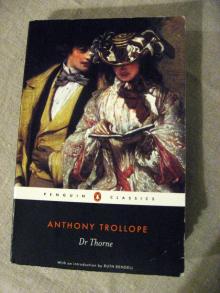 Doctor Thorne
Doctor Thorne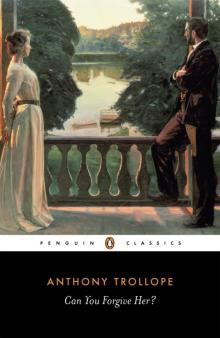 Can You Forgive Her?
Can You Forgive Her?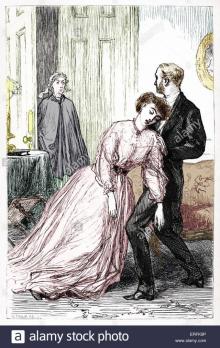 The Last Chronicle of Barset
The Last Chronicle of Barset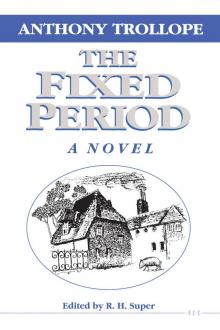 The Fixed Period
The Fixed Period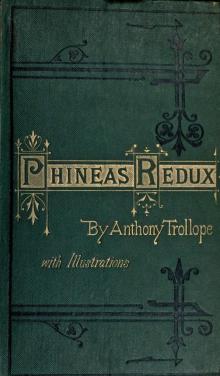 Phineas Redux
Phineas Redux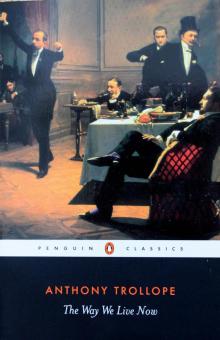 The Way We Live Now
The Way We Live Now Castle Richmond
Castle Richmond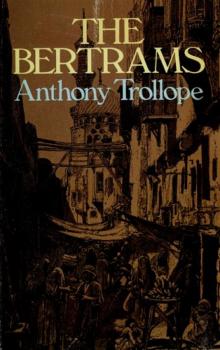 The Bertrams
The Bertrams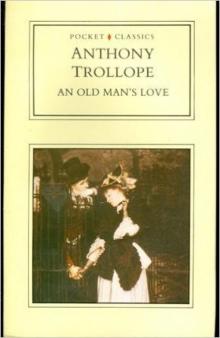 An Old Man's Love
An Old Man's Love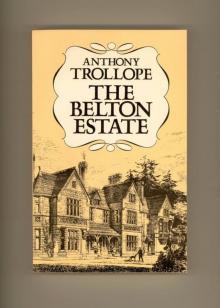 The Belton Estate
The Belton Estate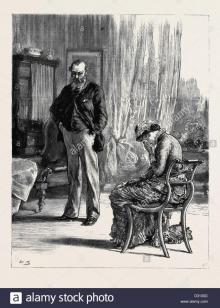 Marion Fay: A Novel
Marion Fay: A Novel The Claverings
The Claverings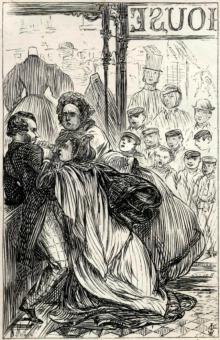 The Struggles of Brown, Jones, and Robinson
The Struggles of Brown, Jones, and Robinson Nina Balatka
Nina Balatka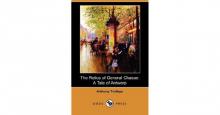 The Relics of General Chasse: A Tale of Antwerp
The Relics of General Chasse: A Tale of Antwerp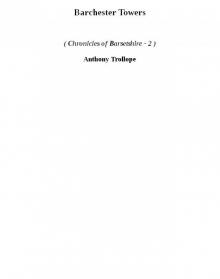 Barchester Towers cob-2
Barchester Towers cob-2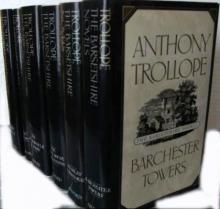 The Chronicles of Barsetshire
The Chronicles of Barsetshire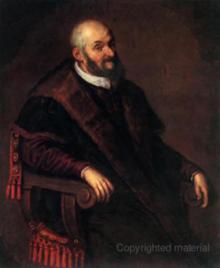 The Warden cob-1
The Warden cob-1 Framley Parsonage
Framley Parsonage Christmas at Thompson Hall
Christmas at Thompson Hall The Warden
The Warden The Palliser Novels
The Palliser Novels The Small House at Allington
The Small House at Allington Barchester Towers
Barchester Towers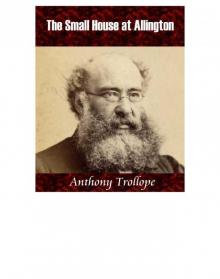 The Small House at Allington cob-5
The Small House at Allington cob-5 The Duke's Children
The Duke's Children Phineas Finn, the Irish Member
Phineas Finn, the Irish Member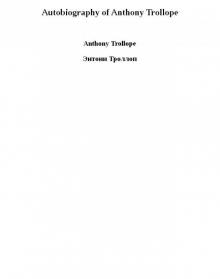 Autobiography of Anthony Trollope
Autobiography of Anthony Trollope